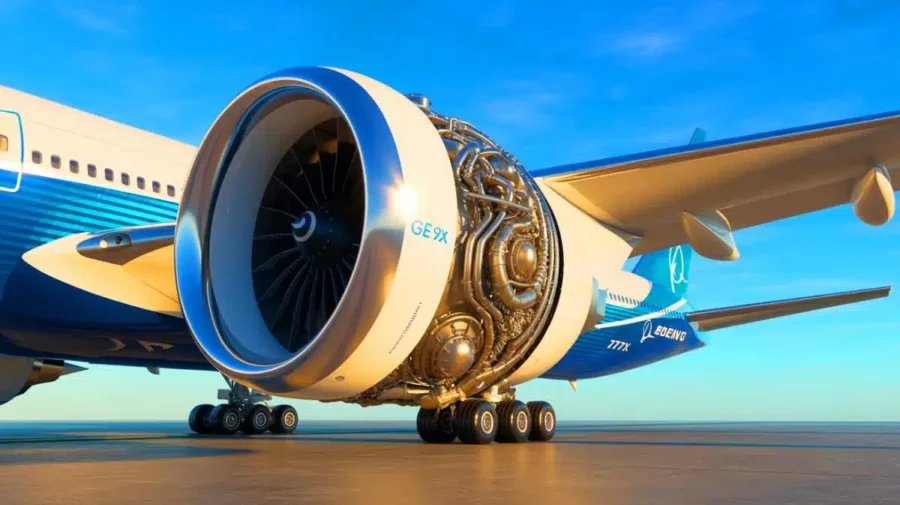GE Aerospace Tests GE9X Engine in Simulated Desert Dust to Meet Emirates’ Demands

GE Aerospace engineers are pushing the limits of jet engine durability by simulating Middle Eastern desert conditions inside their test cells in Peebles, Ohio, targeting the GE9X, the world’s largest and most powerful commercial jet engine designed for the Boeing 777X. The initiative directly supports Emirates Airline, which has more than 200 firm orders for the twin-engine widebody and operates from Dubai International Airport (DXB) — one of the most demanding hot-and-dusty environments in aviation.
The GE9X produces 134,300 pounds of thrust and offers a 10% fuel efficiency gain over its GE90 predecessor. But beyond performance, durability under desert dust conditions has become a top priority. Engineers have replicated Arabian desert chemistry and particle sizes, blasting engine components with custom dust mixtures at flight-level velocities. Since 2022, the company has completed over 1,600 test cycles, with a second campaign underway in 2024 and a third scheduled for 2025.
Carlos Perez, vice president of Commercial Engine Systems Engineering, said these advanced trials draw on 2.3 billion global flight hours of GE data. Using predictive models, engineers analyze how dust erodes turbine blades and combustors, developing coatings and cooling designs to double time-on-wing for engines operating in harsh environments. For the GE9X, ceramic matrix composites (CMCs) and 3D-printed parts are being validated under high heat and debris loads to ensure compliance with Emirates’ reliability standards.
Building on Proven Platforms
Lessons from earlier engines like the GEnx—used on Boeing 787s—and the CFM LEAP—powering Boeing 737 Max and Airbus A320neo aircraft—have directly influenced GE9X enhancements. GEnx engines now exceed 4,000 cycles without overhaul thanks to revised cooling holes, improved coatings, and the 360 Foam Wash system that clears sand buildup. Meanwhile, LEAP engines undergoing “dust vs. clean” tests in Ohio have shown twofold increases in durability, with transferable hardware improvements like seals and turbine coatings.
Preparing for the Future: The RISE Program
The GE9X effort dovetails with GE Aerospace’s CFM RISE (Revolutionary Innovation for Sustainable Engines) demonstrator, which is testing Open Fan architecture targeting 20% fuel savings. The RISE program’s early-stage dust endurance testing—over 3,000 cycles on turbine airfoils—combines efficiency with sand resistance through new composites and cooling systems.
To strengthen regional support, GE Aerospace is investing $50 million to build a 120,000-square-foot MRO (Maintenance, Repair, and Overhaul) center at Dubai South’s Mohammed Bin Rashid Aerospace Hub by early 2027. The expanded facility will service GE9X and LEAP engines, minimizing downtime for Emirates, Qatar Airways, and Etihad Airways.
Defense and Legacy Engine Integration
GE Aerospace’s Defense & Systems division applies similar resilience engineering to its military engines. The F110, used on F-16s, now incorporates LEAP-derived cooling and achieves 750 flight hours between overhauls in sandy environments. The T700 helicopter engine—with over 100 million flight hours—uses advanced inlet separators and hot-section materials to endure extreme desert operations.
Mohamed Ali, GE Aerospace’s Chief Technology Officer, said the company’s approach blends simplicity and innovation. “Designing with fewer parts and smarter materials ensures reliability, even under the toughest conditions,” he noted.
GE9X Orders and Outlook
The GE9X engine exclusively powers Boeing’s next-generation 777-9 and proposed 777-10 aircraft, representing the latest evolution in long-range twinjet performance. With Boeing 777X entry into service planned for 2027, and FAA approval for extended twin operations (ETOPS) expected in 2026, GE Aerospace’s desert endurance tests are positioning the GE9X as the benchmark for power, efficiency, and resilience in long-haul aviation.
Emirates, the world’s largest 777X customer, recently reinforced its commitment at the Dubai Airshow 2025, ordering 130 additional GE9X engines to power 65 new Boeing 777-9s. This latest deal brings Emirates’ total GE9X orderbook to more than 540 engines, including spares and long-term service agreements—cementing its role as GE Aerospace’s largest single customer for the type.
While Emirates leads the program, several other major global carriers have also placed orders for the Boeing 777X, including Lufthansa, Qatar Airways, Etihad Airways, Cathay Pacific, and Singapore Airlines. Each of these airlines will operate the GE9X, underscoring the engine’s central role in shaping the future of long-haul travel. The success of the GE9X program remains tightly linked to Boeing’s 777X family, which currently holds a backlog exceeding 300 aircraft. As additional carriers commit to the type, the total number of GE9X orders is expected to rise, reinforcing the engine’s position as the cornerstone of next-generation widebody propulsion.
Related News: https://airguide.info/?s=boeing+777, https://airguide.info/?s=GE9X
Sources: AirGuide Business airguide.info, bing.com, geaerospace.com, aviationweek.com
